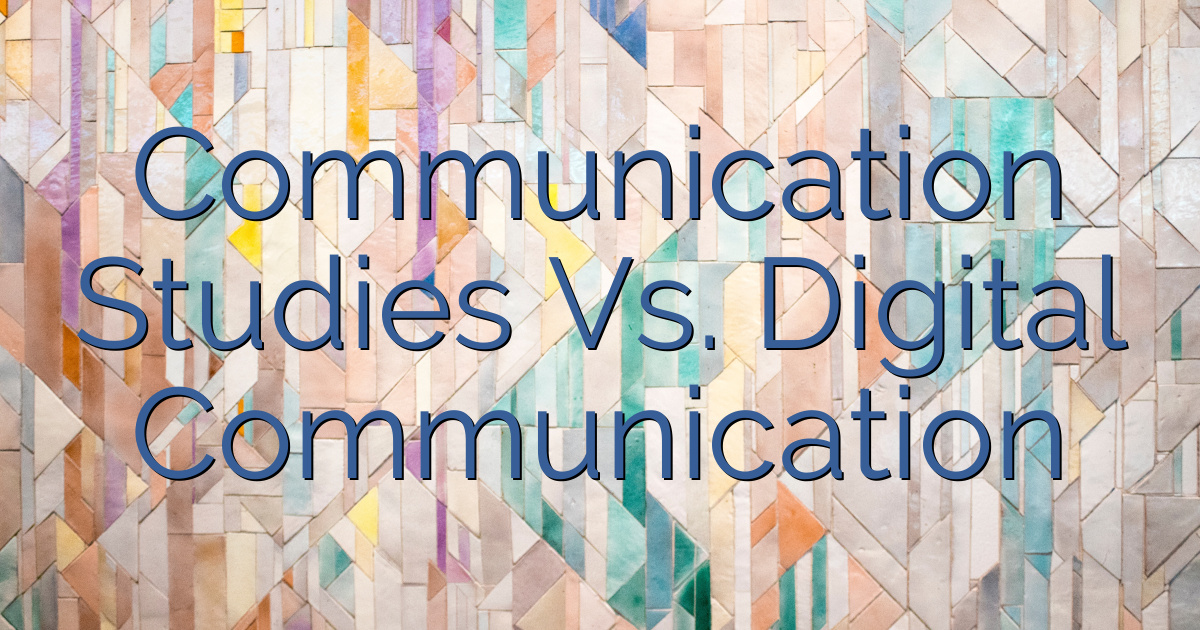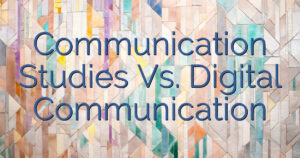
Are you torn between choosing a major in Communication Studies or Digital Communication?
Imagine this: You’re sitting in a bustling coffee shop, engrossed in a deep conversation with a friend. As you both passionately discuss the power of effective communication in today’s digital age, you realize that both majors offer unique opportunities for growth and success.
In this article, we will explore the differences and similarities between Communication Studies and Digital Communication, equipping you with the knowledge to make an informed decision about your academic path.
Table of Contents
Key Takeaways
- Communication Studies focuses on human communication in various contexts, while Digital Communication is more technology-oriented.
- Communication Studies covers topics like public speaking and media analysis, while Digital Communication explores web design and social media management.
- Communication Studies graduates can find opportunities in public relations and media production, while Digital Communication graduates are well-suited for careers in digital marketing and content creation.
- Both majors develop critical thinking and problem-solving abilities, but Communication Studies emphasizes writing and research skills, while Digital Communication emphasizes SEO optimization and branding strategies.
Overview of the two majors: Communication Studies and Digital Communication
If you’re interested in the differences between Communication Studies and Digital Communication, let’s take a closer look at their respective overviews.
When it comes to the curriculum comparison, Communication Studies focuses on the study of human communication in various contexts, including interpersonal, organizational, and mass communication. It covers topics like public speaking, media analysis, and communication theory.
On the other hand, Digital Communication is more technology-oriented, exploring the ways in which digital media shapes communication practices. It delves into web design, social media management, and digital marketing strategies.
In terms of job prospects, Communication Studies graduates can find opportunities in fields like public relations, human resources, and media production. Digital Communication graduates, on the other hand, are well-suited for careers in digital marketing, social media management, and content creation.
Overview of the curriculum of the two majors: Communication Studies and Digital Communication (Courses)
Take a look at the curriculum for each major, and you’ll see that the courses in Communication Studies focus more on theory and research, while the courses in Digital Communication emphasize practical skills like social media management and content creation.
In Communication Studies, core courses typically include topics like interpersonal communication, mass communication, and public speaking. Electives cover areas such as organizational communication and intercultural communication. Students also have the opportunity to gain practical experience through internships at media organizations or public relations firms.
On the other hand, Digital Communication majors take core courses in digital media production, web design, and social media marketing. Electives may include courses on video editing, graphic design, and data analytics. Internship opportunities are often available at digital media companies or advertising agencies.
When considering a career in Communication Studies, you can expect to develop strong research and analytical skills, which are valuable in fields such as academia or market research. Digital Communication, on the other hand, equips you with the practical skills needed for careers in social media management, digital marketing, or content creation.
Ultimately, the choice between the two majors depends on your interests and career goals.
Overview of coursework and assessments in Communication Studies Vs. Digital Communication (Courses)
The coursework in Communication Studies emphasizes theory and research, while Digital Communication focuses on practical skills like social media management and content creation.
In Communication Studies, the coursework structure typically includes a combination of lectures, seminars, and independent research projects. You will delve into topics such as interpersonal communication, media and society, and organizational communication. Assessments in Communication Studies often involve research papers, presentations, and exams that test your understanding of communication theories and concepts.
On the other hand, in Digital Communication, the coursework structure is more focused on hands-on skills development. You will learn about digital marketing, graphic design, video production, and web development. Assessments in Digital Communication often involve creating social media campaigns, designing websites, and producing digital content.
Both majors offer unique coursework structures and assessment methods, allowing you to develop a well-rounded set of skills in either field.
Comparison of Skills Developed: Communication Studies Vs. Digital Communication (Skills)
You will acquire practical skills in social media management and content creation in Digital Communication. These skills will set you apart in the job market and open up a world of opportunities.
Here are some key skills comparison and job prospects to consider:
- Digital Communication
- Social media management
- Content creation and curation
- SEO optimization
- Data analysis and interpretation
- Branding and marketing strategies
- Communication Studies
- Interpersonal communication
- Public speaking and presentation skills
- Writing and editing
- Research and analysis
- Critical thinking and problem-solving
With the rise of social media and digital platforms, the demand for professionals with digital communication skills is on the rise. Companies are looking for individuals who can effectively engage with audiences, create compelling content, and drive online conversations.
Comparison of Career Opportunities and Job Roles in Communication Studies Vs. Digital Communication (Careers)
With the increasing demand for professionals with digital communication skills, you can explore diverse career opportunities and take on various job roles.
In the field of communication studies, career paths such as public relations specialist, marketing manager, and media planner are available. These roles require strong verbal and written communication skills, as well as the ability to analyze and interpret data.
On the other hand, in digital communication, job prospects include social media manager, content creator, and digital marketer. These roles focus on utilizing digital platforms and technologies to effectively communicate messages and engage with audiences.
With the rapid growth of the digital landscape, these career paths offer exciting opportunities for individuals with a passion for communication and technology.
Comparison of Salary Potential in Communication Studies Vs. Digital Communication (Salary)
In terms of salary potential, professionals in communication studies and digital communication can earn competitive salaries based on their job roles and experience.
Here is a comparison of average salaries in communication studies versus digital communication, as well as factors that influence salary potential in these fields:
- Average Salaries:
- Communication Studies: The average salary for communication studies professionals ranges from $48,000 to $74,000 per year, depending on factors such as location, industry, and experience.
- Digital Communication: Professionals in digital communication can earn average salaries ranging from $55,000 to $90,000 per year. Again, factors like location, industry, and experience play a significant role in determining the salary range.
- Factors Influencing Salary Potential:
- Education and Skills: Having advanced degrees and specialized skills, such as social media marketing or data analytics, can increase salary potential.
- Industry and Job Role: Salaries can vary based on the industry and job role, with positions in technology or marketing often offering higher pay.
- Experience: The more experience you have in the field, the higher your earning potential becomes.
Considering these factors, it is clear that both communication studies and digital communication offer competitive salary potential for professionals willing to invest in their education and gain relevant experience.
Similarities in Communication Studies Vs. Digital Communication Curricula
Now that you have a clear understanding of the salary potential in both communication studies and digital communication, let’s take a closer look at the similarities in their curricula.
While these two fields may seem different on the surface, there are actually several key similarities in terms of the courses and skills developed.
Both communication studies and digital communication curricula emphasize the importance of effective communication, critical thinking, and problem-solving skills. In both fields, you will learn how to analyze and interpret messages, develop persuasive arguments, and effectively convey information to different audiences.
Additionally, both curricula often include courses on media literacy, public speaking, and interpersonal communication skills.
Whether you choose communication studies or digital communication, you can expect to develop a strong foundation in communication skills that are applicable in a wide range of careers.
Difference between Communication Studies and Digital Communication Curricula
Although communication studies and digital communication curricula have some similarities, there are also key differences in the courses and skills taught in each field.
Communication studies offers a broad overview of various forms of communication, including interpersonal, organizational, and mass communication. It focuses on theories, research methods, and critical analysis of communication processes.
On the other hand, digital communication curricula specifically emphasize the use of technology in communication, such as social media, web design, and multimedia production. Digital communication programs equip students with practical skills in digital marketing, content creation, and data analytics.
When it comes to job prospects, communication studies graduates often find opportunities in fields like public relations, advertising, and journalism. Digital communication graduates, on the other hand, have an advantage in the expanding digital media industry, including careers in social media management, digital marketing, and web development.
Factors to consider when choosing between Communication Studies and Digital Communication majors
When deciding between a communication studies major and a digital communication major, it’s important to consider factors such as career goals, personal interests, and desired skill sets. Both majors offer unique opportunities and it’s crucial to make an informed decision that aligns with your aspirations.
Communication studies provides a broad understanding of human communication, including interpersonal, organizational, and mass communication. This major can lead to careers in public relations, marketing, event planning, or journalism.
On the other hand, a digital communication major focuses on the use of technology and digital platforms for communication purposes. This major can open doors to careers in social media management, digital marketing, content creation, or web design.
Consider your interests, strengths, and long-term goals to determine which major offers the best career opportunities for you.
Conclusion
Congratulations! You’ve reached the end of this exciting journey comparing Communication Studies and Digital Communication.
Now, it’s time to make your decision. Remember, choosing the right major is like picking the perfect puzzle piece to complete your future. Consider your passions, skills, and career goals carefully.
Whether you choose to dive into the depths of human connection with Communication Studies or embrace the digital world with Digital Communication, your path awaits.
So, go forth and conquer, weaving your own unique tale of success and fulfillment.

